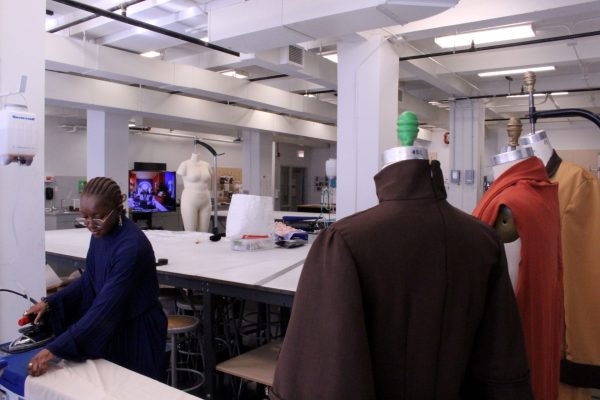Cryptocurrency might be the future of money – if it can shed its emissions problem
FILE – In this Feb. 9, 2021 file photo, the Bitcoin logo appears on the display screen of a crypto currency ATM at the Smoker’s Choice store in Salem, N.H. The price of Bitcoin fell as much as 29% Wednesday, May 19 after the China Banking Association warned members of risks associated with digital currencies. Other digital currencies suffered sharp declines as well. (AP Photo/Charles Krupa, File)
On May 12, tech mogul and Tesla CEO Elon Musk announced on Twitter that the electric vehicle company would no longer accept Bitcoin for purchases, citing concerns over fossil fuels powering bitcoin mining.
Within two hours, the price of one bitcoin dropped over $6,000. As of May 21**, it’s valued nearly $17,000 lower than it was before Musk’s tweet. And with that, concerns over crypto’s environmental impact reached a general public barely aware of what Bitcoin even is.
But what is it about cryptocurrencies that make them so damaging to the environment, and are they inherently harmful? To answer those questions, one must first understand how cryptocurrencies work.
Cryptocurrencies, like traditional currencies, rely on a record of transactions — a ledger — to ensure everyone has the amount of money they say they have. What makes cryptocurrencies different is that instead of a financial institution (such as a bank) storing and updating that ledger, a cryptocurrency’s ledger is shared and verified by the public in an encrypted, decentralized manner known as a blockchain.
“It’s basically a way to share and maintain information among our community of users,” said Lamont Black, assistant professor of finance at DePaul. “Rather than delegating that authority to a trusted third party, it’s done by the community itself.”
Because no individual can be trusted to truthfully verify transactions on the blockchain, cryptocurrencies rely on consensus to ensure that the ledger remains accurate. Essentially, a series of unaffiliated machines (known as “miners”) independently verify that each new section of the blockchain (known as a “block”) lines up with the sections before and after it. When a miner verifies a block, they are rewarded with new Bitcoins.
In the case of Bitcoin and most other cryptocurrencies, the way consensus is reached is through an algorithm known as proof-of-work. With proof-of-work, the verification process is run by all miners at the same time, meaning in order to trick the system into adding a counterfeit block, over 50 percent of the network would have to provide the same fraudulent information.
“It would be infeasible at this point for any server to have that much power,” Black said. “So it’s a very secure and decentralized system, but it’s also inefficient in the aspect of all these servers running this algorithm. That’s why it’s so energy-consuming — because this mechanism requires these algorithms to be run across the entire network.”
Tesla & Bitcoin pic.twitter.com/YSswJmVZhP
— Elon Musk (@elonmusk) May 12, 2021
But how much energy do cryptocurrencies actually use? According to Digiconomist, the annual energy used for Bitcoin alone is 119.68 terawatt-hours — comparable to the annual energy usage by the Netherlands.
That much energy doesn’t come cheap, so miners have found ways of cutting electricity costs.
“Putting your bitcoin mining into countries with lower electricity costs is a popular way of lowering the price,” said Chris Bell, a partner of blockchain-based VR world Somnium Space.
This practice is so popular, in fact, that a recent study suggested about 75 percent of all bitcoin mining occurs in China, mostly due to cheap electricity and undeveloped land.
Many of those defending proof-of-work cryptocurrencies like Bitcoin point out that 76 percent of miners use renewable energy to power their operations at least partially, citing a 2020 Cambridge study. While that is true, they fail to note that renewables only account for 39 percent of crypto mining’s total energy consumption, leaving the remaining 61 percent to non-renewable energy sources — none larger than coal, and with no country more reliant on coal than China.
So, is the solution to simply power crypto mining facilities with a higher percentage of renewable energy sources? It could be, but there may be a simpler answer.
While proof-of-work is by far the most common consensus algorithm used by cryptocurrencies, it’s not the only one. Instead of having everyone in the network verifying blocks at once, an alternative algorithm known as proof-of-stake works as such: prospective validators put up a certain amount of money (a “stake”) in a lottery, a randomization process selects a handful of these individuals, and only those individuals can validate transactions.
“With regards to energy efficiency, it would basically eliminate anything you see numbers-wise, because proof-of stake doesn’t involve much of any computing power to make it run,” said Derek Becker, DevOps engineer at Chainlink Labs. “You put your stake up, and if you’re acting out of order or you’re trying to manipulate the chain, you get your stake cut. So it’s kind of like a collateral.”
Ethereum, the second-largest cryptocurrency behind Bitcoin, hopes to transition to a proof-of-stake algorithm by the end of 2021 — if it does, its carbon emissions would be nearly eliminated entirely.
However crypto may change to meet environmental demands, Becker suggests it will find a way.
“The people in this space, they will adapt, because they have a lot of money in this,” he said. “I don’t think this stuff is going anywhere.”
**: for a more recent estimate, check here and compare it to its previous valuation of $54,590.39













susan davenport • Jun 23, 2021 at 5:32 pm
PLEASE LISTEN TO MY GOOD TESTIMONY NOW
I have lost money several times by sending Bitcoins
I have lost money by sending Bitcoins to wrong address and I have also fallen victim to fake traders who block me and stop talking to me after I send them Bitcoins as investment.
But luckily for me, my friend introduced Mr Jim Uber to me and Mr Jim Uber is a professional Software Manager and Crypto Technician who has worked with Blockchain Company for 5 years now.
Mr Jim Uber helped me to recover back my lost bitcoins just by using a software which I paid for and He asked me to recommend more friends.
I will recommend anyone looking for how to recover back their lost Bitcoins to contact Mr Jim Uber right now,
contact his email now :
jimuberservices@gmail.com or whatsapp him now +19784003014
because he is a Professional and He works with BlockChain company.
regards
pp • May 25, 2021 at 8:46 am
pp